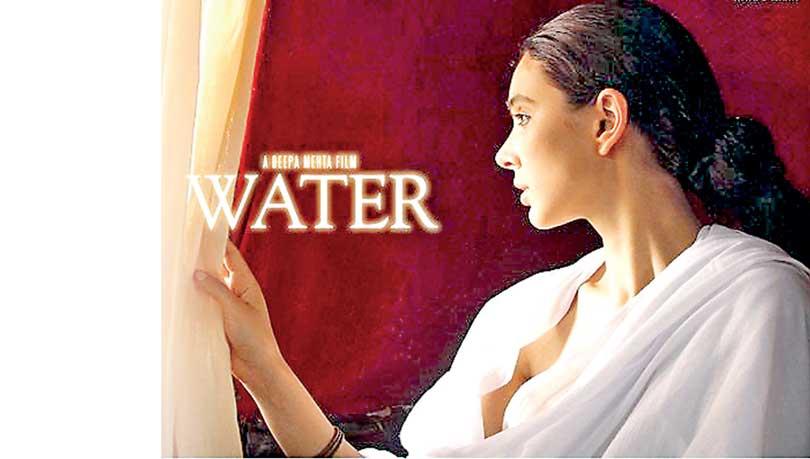Reply To:
Name - Reply Comment

A still from Deepa Mehta’s film ‘Water’
 For the past three decades the Sinhala film industry has languished in a state of economic and emotional crisis. The anguish has always been the tight investment money which slowed the production of Sinhala films. The film industry faced bankruptcy, not just financially, but creatively. The product, ‘motion pictures’, were slumping all too visibly into a stupor of mundane drama. Today, we could be on the threshold of the ‘New Age of Cinema’ in Sri Lanka. This comes at a time of moral and political liberation. When arts and skills combine with passion and purpose in the brief explosion of a nations cultural energy a sudden moment of magic is born and is not necessarily subject to the rules of society.
For the past three decades the Sinhala film industry has languished in a state of economic and emotional crisis. The anguish has always been the tight investment money which slowed the production of Sinhala films. The film industry faced bankruptcy, not just financially, but creatively. The product, ‘motion pictures’, were slumping all too visibly into a stupor of mundane drama. Today, we could be on the threshold of the ‘New Age of Cinema’ in Sri Lanka. This comes at a time of moral and political liberation. When arts and skills combine with passion and purpose in the brief explosion of a nations cultural energy a sudden moment of magic is born and is not necessarily subject to the rules of society.
Quite often a country comes into a New Age of cinematic expression as unpredictability as a poet gets his inspiration. There is no set calendar for such beginnings. An atmosphere is created and magic could happen. It has happened before in England, France, Italy and the United States of America.
In place of the old sacred movie stars that tower over us now another sacred monster, the Great Director, does so. The irreverent, genius and director of the all time classic, “Citizen Kane”, Orson Welles, once said, “LET IT BE WHISPERED THAT FILM DIRECTING, THE JOB ITSELF, IS GROSSLY OVERRATED. GOOD PAINTINGS DON’T COME FROM A BAD PAINTER, BUT GOOD MOTION PICTURES ARE OFTEN SIGNED BY DIRECTORS OF THE MOST INCOMPETENCE. WRITERS, EDITORS, DESIGNERS AND ACTORS DO THE WORK FOR HIM”.
This may be true to some extent, but new, young, creative filmmakers HAVE emerged and directors of the older generation have proved their continued versatility in creating new works of high quality and interest. We hope that the bright sense of discovery and enthusiasm would bring to the screen, a new language and a more original, dynamic and attractive style. The signs are good, provided we are not too seduced by the past and blind to new ideas. The true importance of an artist is judged not by how much he impresses us, but the gifts we receive from him, both visually and spiritually.

A still from Deepa Mehta’s film ‘Water’ which was nominated for an Oscar
THE DIRECTOR MUST BE AWARE NOT TO BE DRUNK WITH THE SOUND OF OUR APPLAUSE AND PRAISE AND THEN SELF DESTRUCT.
In this New Age of Cinema I feel new advanced technology provides access to the youthful talent to participate in the process at much lower costs of production.
WE MUST LET THE HEROES AND HEROINES REMAIN WHERE THEY BELONG: IN FRONT OF THE CAMERAS. WHAT IS REQUIRED BEHIND THE CAMERA IS MORE DISCIPLINE, INTEGRITY, DYNAMISM, CREATIVITY AND LESS GLAMOUR AND PONTIFICATION.
Orson Welles, again, on the subject of the director, said “WE NEED, AT LAST, TO TAKE THE MICKEY OUT OF THE MYTH OF THE DIRECTOR AS ‘THE GREAT MAN’. THE PRESTIGE OF THAT MYTH, THE HEADY SENSE OF POWER, THE GLORIOUS NAPOLEONIC SOLITUDE - NONE OF THIS HAS ANYTHING TO DO WITH THE MAKING OF MOVIES. If no art form is valid today, that’s because movies remain quite uniquely popular. Movies still belong to the people. Self indulgence, the vice of all art, is an obvious temptation to a director invested with his full rights of total authority to the service of his film, and not to his own ego. Let him remain, in the best sense, the servant of his actor, not the actor’s rival for attention. Above all things, let him be loyal to the story.....Who can live without a story? The director who wants to be called the author of his film is not only responsible FOR the story, but responsible TO it”.
Steven Spielberg and David Lean are excellent examples of directors who use their skills as master story-tellers to create films, whose universal, humanist themes can be appreciated by all people, no matter what their cultural or religious backgrounds are.
If there is a New Age of Cinema or Sri Lanka, on the horizon, the new director would find it only when he loves movies even more than he loves himself. It may be the birth of a great New Age, when old and young directors are together reviving a dying industry,
We must start more trends, find more stars and more original and interesting stories to tell. Something entertaining and thoughtful and leave the mundane stories of poverty and rape to the so called auteurs and award seekers.
As individual filmmakers, we do not like to think of movies as an ‘industry’, but as a creation. IT IS AN INDUSTRY AND IT MUST BE RESPECTED AS SUCH.
We must experiment with style and content, but must always keep in mind, that the cinema is the most expensive art form and must record a return, so that the artiste may continue.
Unlike a writer or a painter, a director’s work is not all his own. The ‘motion picture’, while being the most powerful medium of the century is also the most collaborative art form. Every individual that works on the production of the motion picture, makes a contribution that enhances the creation and some times creates a life of its own, in spite of the director. The director, of course is the visionary. The technical team must help enhance his vision.
We look forward with anticipation to entrancing and stimulating visions to delight our sight and minds and bring the filmgoers back to the cinemas.
(The writer is associated with TONTOFLIX PVT LTD and Worldwide distribution of Asian films)
CHANDRAN RUTNAM -FACT BOX
Chandran Rutnam is a Sri Lankan born filmmaker and entrepreneur.
He was educated at St. Thomas Prep School Bandarawela and St Thomas College Gurutalawa.
He lived thirty eight years in Los Angeles and attended the University of Southern California Film School and the San Fernando Valley College of Law.
He was well exposed to the film industry having worked with all the major film studios in Hollywood.
He was the local Line Producer in more than forty international films made in Sri Lanka, Malaysia, the Maldives and the Philippines.
He made his inputs in INDIANA JONES AND THE TEMPLE OF DOOM, the Academy Award winning INDOCHINE, THE SECOND JUNGLE BOOK, the Academy Award Nominee WATER and numerous other productions. He has had the privilege of working with the worlds most prestigious film directors, Sir David Lean, Sir Carol Reed, Steven Spielberg, George Lucas, John Boorman and Regis Wargnier.
Chandran has produced and directed numerous Sinhala and English films.
His film A COMMON MAN, won nominations for four of the mainstream international awards at the Madrid International Film Festival. It won the BEST PICTURE AWARD, the BEST DIRECTOR and the BEST ACTOR AWARD. ( Sir Ben Kingsley)
Chandran had the distinction of being the first Asian director to win the BEST DIRECTOR AWARD in a mainstream International Film Festival since 1954, when Satyajit Ray won the BEST DIRECTOR AWARD. His most recent film, ACCORDING TO MATTHEW bagged the BEST PICTURE AWARD at the DERENA FILM AWARDS.
Chandran is the Chairman of ASIAN AVIATION CENTRE PVT LTD providing courses in Aircraft Engineering, Maintenance and Design, affiliated to the Kingston University in the United Kingdom. ASIAN AVIATION CENTRE provides Flight training for the Private and Commercial Pilot Licences. Chandran was the Founder / Chairman of LIONAIR, the first domestic schedule airline serving ten destinations throughout the island.
Chandran is also the Chairman of ASIAN FILM LOCATION SERVICES PVT LTD the foremost film service and equipment provider, celebrating forty years in the business.
In October of this year he will be launching his new platform TONTOFLIX, providing cinema entertainment to the world, along with a network providing good Sinhala films to cinema theatres in the United States of America, Canada and all of South America.
TONTOFLIX will support and create an opportunity for young filmmakers to create cinema entertainment.